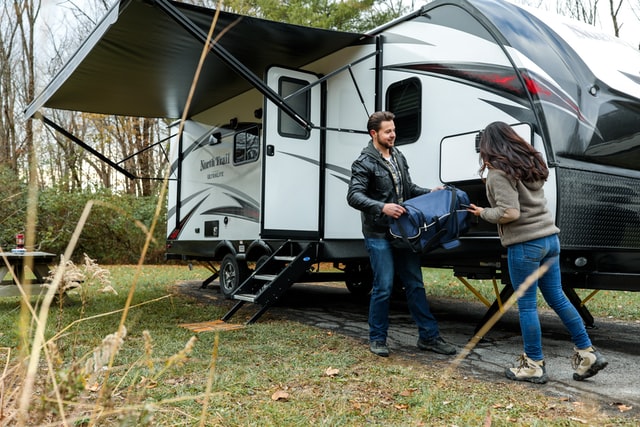7 Tips for Storing Your RV During Winter
Properly storing your RV during winter is very important. After all, you want your recreational vehicle waiting for you in perfect condition and road-ready once the weather gets warmer. Don't forget that an RV is a substantial long-term investment, so you need to make sure to protect it. To help you keep your vehicle safe during winter, you can find tips for preparing your RV for winter storage right in this article.
Tips for safely storing your RV during winter
Many people decide to put their RV in storage and wait for spring to continue their adventures. If you are one of them, keep in mind that preparing your vehicle for winter storage is a crucial step you shouldn't skip. Further in this article, you will learn how to "winterize" your RV and prepare it for being stored during colder months.

1. Drain the water system
When preparing your RV for storage, the most important step is to drain the water system. If there is water left in the plumbing system, there is a risk of it freezing and breaking the fitting and lines. This could delay your spring adventure and be costly to fix.
Depending on your RV's plumbing system, you might be able to drain it on your own. After you've drained the fresh water and waste tanks, it's important to pump non-toxic RV antifreeze through the water system and give it an additional layer of protection from freezing temperatures.
If you don't want to risk causing any damage or simply don't feel like investing your time into doing this, you can always hire an experienced professional to help. There are plenty of reputable service centers where you can have your RV's water system drained quickly.
2. Prepare the exterior
The next thing to do is take your RV to a mechanic and have a thorough inspection of the roof, seams, exterior doors, windows, and sidewalls. If there are any holes or cracks, make sure to reseal them, as this will help prevent potential water damage.

Before you start resealing any cracks or holes, make sure to consult with your RV dealer or an experienced mechanic. They will know the right sealant for your RV and your climate. In case you choose the wrong one, you might make your RV susceptible to water damage, and that's probably the last thing you want to happen.
3. Choose the right place for storing your RV during winter
In an ideal case, you'll be able to store your RV in a shelter or under a roof during winter. However, this is not possible for many RV owners. If you plan on storing your RV during winter in your driveway or yard, make sure to find a location sheltered from the wind and out of the way of any trees.
You can also park your RV on the street, but you have to research different regulations. To avoid potential parking issues, the best way to go is to rent vehicle storage. We recommend finding a vehicle storage facility near you so you can occasionally stop by during winter and check up on your RV.
4. Ensure that the tires are protected
The tires on your RV can be very susceptible to weather damage, especially UV rays. To avoid potential damage, ensure your tires are protected with covers. Keep in mind that many covers designed for the body of your RV won't cover the tires, so you'll have to look for covers specially made for them. They can often be found in different RV dealerships.
5. Make your RV critter-resistant
When storing your RV during winter, another thing to be mindful of is potential critter infestation. Squirrels and mice love turning RVs into their winter homes, and you need to make sure they know they aren't welcome. Otherwise, you're risking them chewing through wires and other plastic and rubber components.
The first step towards ensuring your RV is critter-free is to remove all the food and thoroughly clean the freezer, refrigerator, floors, cupboards, and countertops. To be on the safe side, make sure to place mouse and ant traps, too.
Most importantly, pay attention to potential entrance points where different pests can come in. Have the underside of your RV inspected and if there are any holes or cracks, make sure they are sealed before storing your vehicle.
6. Go through this checklist
Before storing your RV during winter, here's what you need to ensure is done:
7. Do regular check-ups
Lastly, make sure to conduct quick inspections of your RV during winter. Preferably, every 2-3 weeks while it's in storage. This way, you can ensure there isn't any exterior damage. In case there are any issues, you can sort them straight away. On the other hand, if you're planning to store your RV in one of the indoor storage facilities, make sure to organize it for frequent access.

The bottom line
If you want to spend your winter without having to worry if your RV will be road-ready until spring, leave the job to the professionals and rent vehicle storage. That way, storing your RV during winter will be easier than ever.


